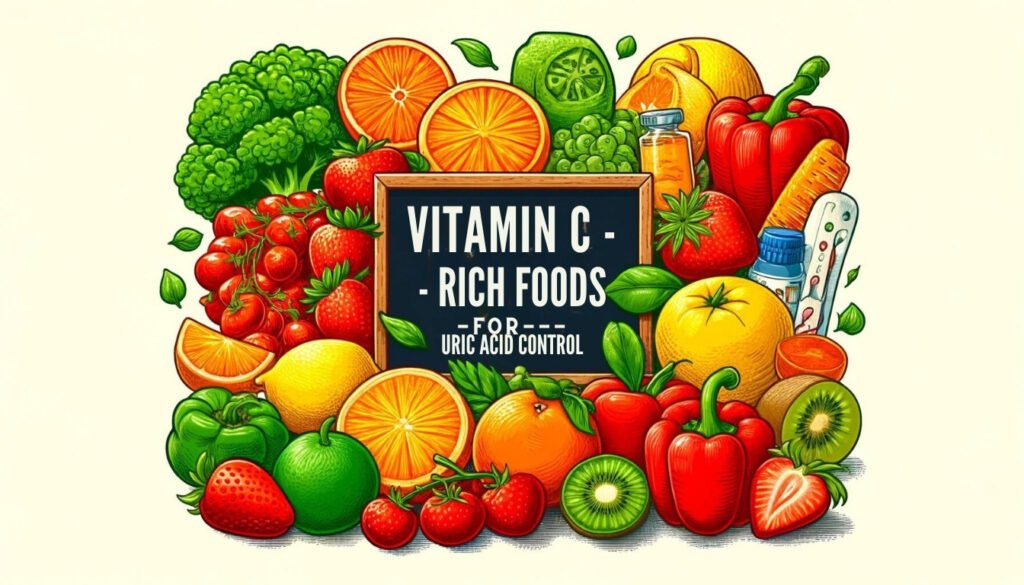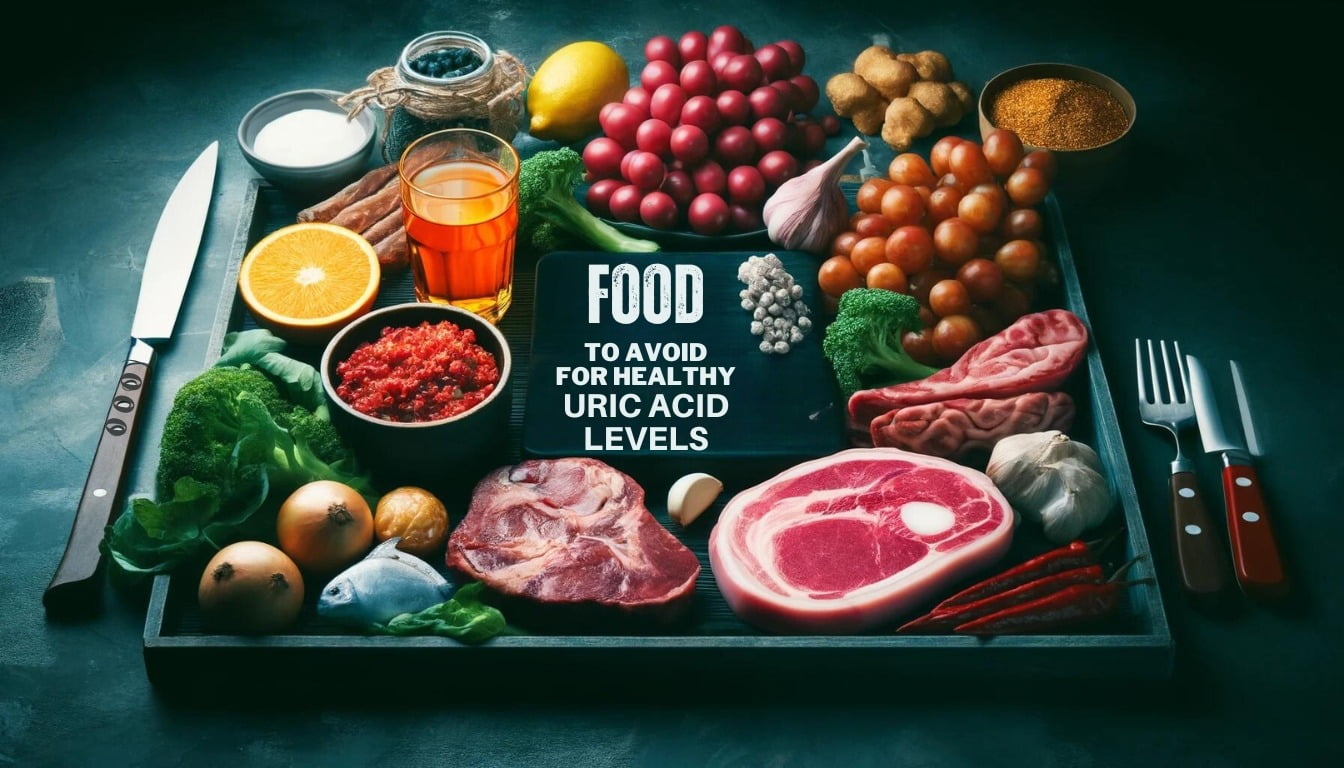Understanding Uric Acid: Its Role and Impact on Health
Explanation of Uric Acid and Its Role in the Body
Purines, compounds present in some foods and produced by the body, break down into uric acid as a waste product. Normally, the kidneys filter this substance out and excrete it through urine. In moderation, uric acid plays a crucial role in antioxidant activity, helping to neutralize free radicals in the body. To maintain healthy uric acid levels, it is essential to know the foods to avoid for healthy uric acid levels.
However, when levels of uric acid become elevated beyond what the body can effectively eliminate, it can lead to health issues such as gout or kidney stones. The uric acid crystallizes when present in excessive amounts and accumulates in joints or tissues, causing inflammation and intense pain characteristic of gout.
The condition occurs when there is an imbalance between the production and elimination of uric acid, leading to high levels circulating in the bloodstream. For individuals predisposed to gout or those with existing kidney problems, maintaining normal uric acid levels becomes paramount for overall well-being.

The Importance of Maintaining Normal Uric Acid Levels for Overall Health
The significance of keeping uric acid levels within a healthy range cannot be overstated, as it directly impacts various aspects of one’s health. Elevated uric acid not only contributes to the development of painful conditions like gout but also poses risks to cardiovascular health.
Research has shown that high levels of uric acid are associated with an increased risk of hypertension, heart disease, and stroke.
Moreover, abnormal uric acid levels can signal underlying metabolic issues such as insulin resistance or obesity. By actively monitoring and managing uric acid levels through dietary choices and lifestyle modifications, individuals can reduce their susceptibility to these health complications while promoting their overall well-being.
Embracing a diet that supports optimal uric acid regulation is fundamental for maintaining good health and preventing associated ailments.

Top Foods to Avoid for Maintaining Normal Uric Acid Levels
Avoid These Purine-Rich Foods
Certain foods contain purines, natural substances that the body breaks down into uric acid. Consuming high-purine foods can lead to an increase in uric acid levels, making them important to avoid for individuals looking to maintain normal levels. Red meats like beef, lamb, and pork are notorious for their high purine content. You should consume these meats sparingly or replace them with leaner protein sources like poultry or plant-based proteins such as legumes and tofu.
Those aiming to control their uric acid levels should strictly limit or completely avoid eating organ meats like liver, kidneys, and sweetbreads because they are exceptionally high in purines. While these organ meats may be considered delicacies in some cuisines, their impact on uric acid metabolism is significant. By opting for lean cuts of meat or plant-based alternatives, individuals can reduce their intake of purines without compromising on taste or nutrition.
Seafood lovers need to be mindful when it comes to certain varieties known for their high purine content. Anchovies, sardines, mackerel, and scallops are examples of seafood that can contribute to elevated uric acid levels. While seafood is a valuable source of omega-3 fatty acids and other nutrients, those concerned about gout or hyperuricemia should moderate their consumption of these specific types of fish.
Choosing lower-purine seafood options like salmon or shrimp can still provide health benefits without the same risk of triggering uric acid build-up in the body.

Limit High-Fructose Foods and Beverages
The prevalence of high-fructose foods and beverages in modern diets has raised concerns regarding their impact on overall health, including uric acid levels. Sugary drinks like soda and fruit juices loaded with added sugars pose a dual threat: they contribute to weight gain and increase uric acid levels in the bloodstream.
Fructose metabolism can lead to increased production of uric acid, exacerbating existing conditions like gout. Processed foods containing high-fructose corn syrup present another challenge for individuals seeking to manage their uric acid levels through diet control.
You can find this common sweetener in a wide range of products, such as soft drinks, desserts, sauces, and snacks marketed as convenient options for busy consumers. However, the hidden danger lies in how these processed foods can disrupt metabolic processes related to purine breakdown and elimination. By scrutinizing food labels for hidden sources of high-fructose corn syrup and opting for whole foods instead, individuals can make informed choices that support a healthier uric acid balance.
Incorporating whole fruits into your diet offers a natural way to enjoy sweetness without the negative consequences associated with added sugars or artificial sweeteners. Fruits like berries, citrus fruits, apples, and pears provide essential vitamins while contributing dietary fiber that aids digestive health. Swapping sugary drinks for infused water flavored with fruit slices or herbal teas sweetened with natural honey sparingly instead would not only help regulate blood sugar but also assist in managing uric acid within acceptable ranges.

Other Foods and Drinks That Can Increase Uric Acid Levels
How Alcohol Affects Uric Acid Levels
Alcohol consumption is strongly linked to an increase in uric acid levels in the body. Beer, in particular, has been identified as a major culprit due to its high purine content and the way alcohol metabolizes in the body. When alcohol is broken down, it creates a substance called acetaldehyde, which can inhibit the excretion of uric acid by the kidneys. This can lead to a buildup of uric acid in the bloodstream, increasing the risk of conditions like gout.
Vegetables to Consume with Caution
While vegetables are generally considered healthy and beneficial for overall well-being, some individuals may need to be cautious about consuming certain types that can potentially elevate uric acid levels. Spinach, asparagus, cauliflower, and mushrooms are examples of vegetables that contain moderate to high levels of purines.
Purines are natural compounds that break down into uric acid during digestion. For individuals who are prone to hyperuricemia or have a history of gout attacks, it may be advisable to limit their intake of these specific vegetables to help manage uric acid levels effectively.
In addition to their purine content, some vegetables, like spinach, also contain oxalates that can contribute to kidney stone formation in susceptible individuals. While these vegetables offer valuable nutrients and health benefits when consumed in moderation by most people, those with elevated uric acid levels or gout may benefit from consulting with a healthcare provider or nutritionist for personalized dietary recommendations tailored to their specific needs and health concerns.

The Importance of Hydration for Uric Acid Control
Maintaining adequate hydration is crucial for managing uric acid levels in the body. Water plays a significant role in diluting uric acid and aiding its excretion through urine. When you stay well hydrated, your kidneys better filter and eliminate excess uric acid from your system.
You should drink at least 8–10 glasses of water daily, but your individual needs may vary based on factors such as activity level, climate, and overall health. Aside from water, certain fluids, like herbal teas and natural fruit-infused waters, can also contribute to your daily fluid intake.
However, it’s essential to limit or avoid sugary beverages and alcohol, as they can exacerbate uric acid levels. These drinks not only provide empty calories but can also lead to dehydration, making it harder for the body to eliminate uric acid efficiently. Opting for water as the primary source of hydration is ideal for promoting overall health and supporting kidney function. Moreover, staying hydrated has numerous other health benefits beyond just managing uric acid levels.
Proper hydration helps maintain optimal organ function, aids digestion, supports joint health, promotes clear skin, boosts energy levels, and enhances cognitive function. By making a conscious effort to drink enough water throughout the day, you not only support your body in controlling uric acid but also improve your overall well-being.

Crafting a Balanced Diet to Manage Uric Acid
Incorporating a balanced diet rich in nutrient-dense foods is essential for maintaining normal uric acid levels. When it comes to reducing the risk of hyperuricemia—higher levels of uric acid in the blood—including specific dietary components can be beneficial. Milk and yogurt, as low-fat dairy products, positively impact uric acid levels by lowering them due to their protein content and potential anti-inflammatory properties.
Casein protein in dairy products helps reduce serum uric acid levels by increasing its excretion through urine. Additionally, calcium-rich foods like low-fat yogurt play a role in inhibiting the reabsorption of urate by the kidneys, further aiding in lowering overall uric acid concentrations in the body. Including these dairy options as part of a balanced diet not only provides essential nutrients like calcium and vitamin D but also supports optimal kidney function.
Furthermore, focusing on consuming whole grains, lean proteins, fruits, vegetables, nuts, seeds, and legumes can help create a well-rounded eating plan that benefits overall health while potentially lowering the risk of developing conditions related to high uric acid levels. A diet rich in antioxidants such as vitamin C – containing fruits like citrus fruits, strawberries, kiwi, and bell peppers may also have protective effects against gout attacks. By emphasizing nutrient-dense foods that promote kidney function and reduce inflammation, individuals can take proactive steps towards maintaining normal uric acid levels through their diet.

Boosting Uric Acid Control with Vitamin C-rich Foods
Studies have shown that vitamin C, a powerful antioxidant, lowers uric acid levels in the body. Studies have suggested that vitamin C may help reduce the risk of gout attacks by lowering serum uric acid concentrations. Foods rich in vitamin C include citrus fruits like oranges, lemons, and grapefruits, as well as strawberries, kiwis, bell peppers, and tomatoes. Incorporating these vitamin C-rich foods into your diet can potentially help manage uric acid levels and reduce the risk of gout flare-ups.
In addition to its antioxidant properties, vitamin C plays a crucial role in collagen synthesis and immune function. By maintaining adequate levels of vitamin C in your diet through whole foods or supplements, if necessary, you may also support overall joint health and reduce inflammation associated with high uric acid levels.
It is important to note that while vitamin C can be beneficial for managing uric acid levels, it is not a replacement for other dietary modifications and lifestyle changes recommended for individuals at risk of gout. Including a variety of vitamin C-rich foods in your daily meals can not only benefit your overall health but also contribute to maintaining normal uric acid levels.
However, it is essential to consult with a healthcare provider or nutritionist before making significant changes to your diet or taking supplements to ensure they align with your individual health needs and goals. By incorporating these nutrient-dense foods into your balanced diet along with other recommended strategies for managing uric acid levels, you can take proactive steps toward better joint health and overall well-being.

Can Coffee Help Reduce Uric Acid Levels?
Coffee, one of the world’s most popular beverages, has captured scientific interest due to its potential effects on reducing the risk of developing gout. Research suggests that consuming coffee may lower serum uric acid levels and reduce the risk of gout attacks. The antioxidants in coffee beans, such as chlorogenic acids, help neutralize free radicals and reduce inflammation in the body, contributing to these potential benefits.
Several studies have indicated an inverse relationship between coffee intake and serum uric acid levels among individuals at risk for gout or those already diagnosed with the condition. Moderately consuming coffee reduces the likelihood of experiencing gout flares or developing chronic hyperuricemia over time.
While researchers need to conduct more studies to fully understand the mechanisms behind coffee’s effects on uric acid metabolism, these findings suggest that enjoying coffee as part of a balanced diet may offer some protective benefits against gout.. As with any dietary recommendation related to managing gout or maintaining optimal health, moderation is key when it comes to consuming coffee.
Excessive caffeine intake from multiple sources, like energy drinks or certain medications, can very well have adverse effects on some individuals’ health outcomes. It’s essential to consider individual tolerance levels and overall dietary habits when incorporating coffee into your routine as part of an integrated approach toward promoting joint health and reducing the risk factors associated with elevated uric acid levels.
Conclusion
Key Takeaways for Managing Uric Acid Levels Through Diet
It is crucial to be mindful of the foods you consume to maintain normal uric acid levels and reduce the risk of conditions like gout. Avoiding purine-rich foods such as red meat, organ meats, and certain seafood can help prevent the buildup of uric acid in the body. Additionally, limiting high-fructose foods and beverages like sugary drinks and processed foods with added sugars can also aid in maintaining healthy uric acid levels. Alcohol consumption, especially beer, should be moderated, as it can contribute to elevated uric acid levels.
While certain vegetables like spinach, cauliflower, and mushrooms may affect some individuals by increasing uric acid levels, it’s important to pay attention to how your body responds to these foods. Remember that staying hydrated by drinking plenty of water is key in flushing out excess uric acid from the body. Incorporating a balanced diet that includes low-fat dairy products like milk and yogurt can also help reduce uric acid levels. For more information, learn about what are the symptoms of high uric acid levels in the body
By adopting a diet that avoids high-purine and high-fructose foods while being mindful of alcohol consumption and staying well-hydrated, you are taking proactive steps toward maintaining normal uric acid levels. By making these dietary changes, you not only support your overall health but also potentially reduce the likelihood of experiencing conditions related to elevated uric acid, such as gout. Embrace your journey towards healthier eating habits with optimism, and know that each choice you make contributes to your long-term well-being.
FAQ’s
What is uric acid, and how is it produced?
Purines, which are substances present in some foods and also produced by the body, break down to form uric acid as a waste product. It is typically dissolved in the blood and excreted through urine.
Why is it important to maintain normal uric acid levels?
Maintaining normal uric acid levels is crucial because elevated levels can lead to health issues such as gout, kidney stones, hypertension, heart disease, and stroke.
What are the symptoms of high uric acid levels in the body?
Symptoms of high uric acid levels include intense joint pain (especially in the big toe), joint redness and swelling, and the formation of tophi (hard lumps of uric acid crystals).
Which foods should be avoided to maintain normal uric acid levels?
Foods high in purines, such as red meats (beef, lamb, and pork), organ meats (liver, kidneys), and certain seafood (anchovies, sardines, mackerel, and scallops), should be avoided. High-fructose foods and beverages like sugary drinks and processed foods with high-fructose corn syrup should also be limited.
How does alcohol affect uric acid levels?
Alcohol, especially beer, can increase uric acid levels because it is high in purines and because alcohol metabolism produces acetaldehyde, which can inhibit the excretion of uric acid by the kidneys.
Are there any vegetables that can affect uric acid levels?
Individuals prone to hyperuricemia or gout may need to consume vegetables like spinach, asparagus, cauliflower, and mushrooms with caution, as these vegetables contain moderate to high levels of purines.
What role does hydration play in managing uric acid levels?
Staying well-hydrated helps dilute uric acid and aids its excretion through urine. To help manage uric acid levels, you should drink at least 8–10 glasses of water daily.
How can a balanced diet help manage uric acid levels?
A balanced diet that includes low-fat dairy products, whole grains, lean proteins, fruits, vegetables, nuts, seeds, and legumes can help manage uric acid levels by providing essential nutrients, reducing inflammation, and supporting kidney function.
Can vitamin C help reduce uric acid levels?
Yes, vitamin C is a powerful antioxidant that can help lower uric acid levels in the body. Foods rich in vitamin C include citrus fruits, strawberries, kiwis, bell peppers, and tomatoes.
Is coffee beneficial for reducing uric acid levels?
Moderately consuming coffee lowers serum uric acid levels and decreases the risk of gout attacks. The antioxidants in coffee, such as chlorogenic acids, help neutralize free radicals and reduce inflammation.






